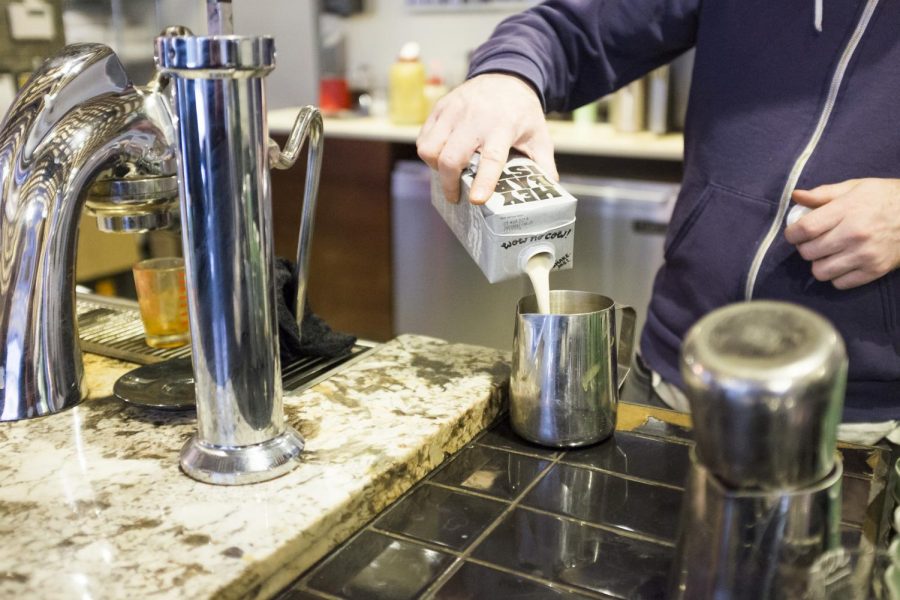New York’s Newest Non-Dairy Trend: Oat Milk
A barista pours Oatly oat milk at City of Saints on Astor Place.
March 19, 2018
When Amber Ward heard about oat milk for the first time, she was skeptical. But after trying the drink at Champs, a vegan diner in Brooklyn, the Steinhardt senior instantly fell in love.
“I thought it was really weird,” Ward said. “I’m not a big oat person. But I poured it in my coffee, and it tasted better than any other milk products that I had tried before.”
Oat milk, a trendy dairy alternative, is popping up in coffee shops all over New York City. Coffee fans swear by it, raving that it isn’t too sweet, thin or watery. And they say it goes surprisingly well with their morning joe.
“Oat milk markets itself well in coffee shops because of its frothability,” CAS senior Rae Frey said.
For coffee drinkers who noticed a lack of froth in almond or soy milk lattes, oat milk is a welcomed alternative. Coffee shops near campus, like City of Saints, Think Coffee and Bluestone Lane, are using a special barista-edition oat milk, sold by a Swedish brand called Oatly. This special barista blend has added oil to give oat milk more body when steamed.
Frey, a self-declared “sort-of vegetarian” said that oat milk doesn’t compromise on taste or texture when she’s drinking her espresso.
“I love a good mouth-feel when I have a latte,” Frey said.
Oat milk’s rise in popularity sources back to Oatly’s recent launch in the United States. With offices now in New York, the Swedish brand is advertising in coffee shop sandwich boards, subway ads near campus and YouTube. A recent video featured the company’s CEO singing “Wow, no cow” in a field of oats.
For coffee drinkers and non-coffee drinkers alike, oat milk has some surprising health benefits. It is dairy and gluten-free. It doesn’t contain popular allergens like nuts or soy. Unlike some alternative dairy milks, Oatly does not have added sugar or vanilla flavoring.
Marion Nestle, Paulette Goddard professor and professor emerita in the Steinhardt Food Studies program, said that one benefit of drinking oat milk is getting the nutrients from oats, a healthy grain.
“It has the nutritional benefits of oats — vitamins, minerals, protein and fiber,” she wrote in an email to WSN.
Oatly also said its product is not a Genetically Modified Organism, a selling point for the sustainability-minded. For students concerned about the carbon emissions of cow’s milk, the GMO ingredients in soy milk and the water-intensive nature of almond milk production, Oatly is an environmentally-friendly alternative.
“It is not just a trend,” said Kristen Arnold, a CAS senior in environmental studies who works in NYU’s Office of Sustainability. “Oatly is pushing on the fact that they want to compliment taste with reducing environmental impact. Hopefully it is not reflective of a short-term trend but a long-term transition away from dairy milk.”
While oat milk is an exciting addition to the non-dairy milk menu, it can be a costly alternative. As it makes its ways into U.S. markets, shoppers can find the quart-sized container in stores for roughly $5 or a half gallon on Fresh Direct for $5.29.
Some coffee shops charge an extra quarter or two for choosing the non-dairy milk in their drinks. But for Ward, who prefers to get her oat milk at shops like La Colombe and Third Rail, the surcharge is worth it.
“I only go to coffee shops that have oat milk at this point,” Ward said.
Frey agreed, saying that despite the cost, oat milk is an important addition for sustainable foods.
“Is it a luxury?” Frey said. “Sure. But I think it’s cool.”
A version of this article appeared in the Monday, March 19 print edition. Email Claire Thighe at [email protected].

























































































































































Kelly • Mar 20, 2018 at 10:47 am
Oat milk is also delicious in baked goods – it gives them a beautiful golden brown color. Learned that from Vegan For Everybody by America’s Test Kitchen, and it’s a go-to baking milk in our house now!